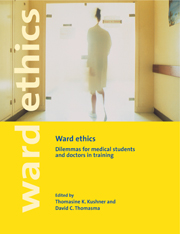Book contents
- Frontmatter
- Contents
- Acknowledgments
- List of contributors
- Prologue. Breaking the silence
- Letter from a young doctor
- Part I On caring for patients
- Section 2 Problems in truth-telling
- Section 3 Setting boundaries
- Part II On becoming a “team player”: searching for esprit de corps and conflicts of socialization
- Section 5 Argot, jargon, and questionable humor: assuming the mantle at the patient's expense
- Section 6 Making waves: questioning authority and the status quo
- Section 7 Perceiving misconduct and whistle-blowing: observing peers or superiors commit an act deemed unethical
- Epilogue: Using this book
- Glossary
- Index
Epilogue: Using this book
Published online by Cambridge University Press: 05 February 2015
- Frontmatter
- Contents
- Acknowledgments
- List of contributors
- Prologue. Breaking the silence
- Letter from a young doctor
- Part I On caring for patients
- Section 2 Problems in truth-telling
- Section 3 Setting boundaries
- Part II On becoming a “team player”: searching for esprit de corps and conflicts of socialization
- Section 5 Argot, jargon, and questionable humor: assuming the mantle at the patient's expense
- Section 6 Making waves: questioning authority and the status quo
- Section 7 Perceiving misconduct and whistle-blowing: observing peers or superiors commit an act deemed unethical
- Epilogue: Using this book
- Glossary
- Index
Summary
One physician-educator we interviewed for the book concluded,
Currently ward ethics issues are handled, when they are handled at all, on an ad hoc basis. The message is that these issues are not that important. The situation must change but it will not change overnight and it will not change without ruffling feathers.
Even if some feather-ruffling is inevitable, given any institution's natural resistance to change, there are still a number of ways in which training dilemmas such as those described in this book could be identified and addressed. Our recommendations can be summarized in three categories: education, reporting, and organizational responsibility.
Education
Educational opportunities can range from occasions as informal as brown bag lunches to ward ethics cases incorporated as an integral part of the curriculum itself. The latter might take the form of:
1 Ward ethics rounds. Once a week the various services could devote one of their rounds to ward ethics dilemmas. During these sessions trainees present cases and participate in a forum on how best to address the issues generated on this particular service. For example, the intern who complained of her discomfort in being given an order to deliver devastating news to a patient with whom she had had no previous contact, would have the opportunity to discuss her own feelings and response.
- Type
- Chapter
- Information
- Ward EthicsDilemmas for Medical Students and Doctors in Training, pp. 255 - 258Publisher: Cambridge University PressPrint publication year: 2001

